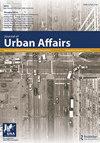How pervasive is source of income discrimination faced by housing choice voucher households: Lessons from a progressive Midwestern city
IF 1.9
3区 经济学
Q2 URBAN STUDIES
引用次数: 0
Abstract
ABSTRACTHousing Choice Voucher (HCV) recipients encounter many types of discrimination in the housing search process. Landlords could choose not to lease a home to HCV recipients merely because they are HCV recipients. While many forms of discrimination (such as discrimination because of race or gender) are proscribed by federal and state constitutions, discrimination based on source of income (such as paying rent using an HCV) is not banned by the federal constitution or by most state or local statutes. Discrimination faced for using an HCV makes the housing search process more complicated and time-consuming for HCV recipients, often restricting their housing options and resulting in sub-optimal housing choices. We report on the findings of a study exploring the relative magnitude of discrimination for using HCV compared to other types of discrimination among HCV recipients of a Midwestern public housing authority (PHA). We also report on how this source of income discrimination varies by race and other socioeconomic and demographic factors. Information for this study was collected by surveying all HCV families of this PHA using a mail-out/mail-back questionnaire. Our findings suggest that source-of-income discrimination is perhaps more pervasive than other common discriminatory factors. We conclude the paper by describing policy responses to our findings.KEYWORDS: Affordable housinginequalityrace Disclosure statementNo potential conflict of interest was reported by the author(s).Notes1. Code of the City of Iowa City, Title 2 (Human Rights), Chapter 5 (Fair Housing).Additional informationNotes on contributorsJerry AnthonyJerry Anthony, PhD, FAICP, is an associate professor at the School of Urban & Regional Planning at the University of Iowa. He has an undergraduate degree in Architecture, a graduate degree in Town Planning, and a PhD in Urban & Regional Planning. He researches U.S. housing policy issues, U.S. land policy issues, and international planning issues, particularly in South Asia. He is a co-founder of the Housing Trust Fund of Johnson County (https://www.htfjc.org/). He has developed several interactive online maps on housing issues; for example, a map depicting housing cost burdens in U.S. counties in 1990, 2000, 2010, and 2015 can be found at http://ppc.uiowa.edu/housing/affordability. His research has been supported by many entities such as the Lincoln Institute of Land Policy, the U.S. Department of Housing & Urban Development, The Brookings Institution, and the Office of the Attorney General of the State of Iowa in the United States. He was a Fulbright Scholar in India in 2023.Parya SeifParya Seif is an associate planner at the County of Santa Clara, Planning and Development Department. She is a certified quarry inspector and manager of the Tree Removal and Preservation Program at the County of Santa Clara. Parya got her Master’s degree in Urban and Regional Planning from the University of Iowa, and another Master’s degree in Architecture from the University of Kashan. Her work is focused on land development management, planning policies and laws, as well as environmental preservation.Rachael SchaeferRachael Schaefer works as planner II at the City of Cedar Rapids, Iowa, where she focuses on the development and implementation of long-range planning activities and policy creation. Prior to this, she was the senior planner for Johnson County, Indiana, where her focus was on planning, zoning, subdivision platting, and other community development activities. Rachael received a Master’s in Urban and Regional Planning from the University of Iowa’s School of Planning and Public Affairs. Rachael is passionate about creating thriving and equitable communities.住房选择券家庭面临的收入歧视来源有多普遍:来自一个进步的中西部城市的教训
【摘要】住房选择券(HCV)接受者在住房寻找过程中会遇到多种歧视。房东可以选择不把房子租给丙型肝炎病毒感染者,仅仅因为他们是丙型肝炎病毒感染者。虽然联邦和州宪法禁止许多形式的歧视(如种族或性别歧视),但联邦宪法或大多数州或地方法规并未禁止基于收入来源的歧视(如使用HCV支付租金)。使用HCV所面临的歧视使HCV接受者的住房寻找过程更加复杂和耗时,往往限制了他们的住房选择并导致次优住房选择。我们报告了一项研究的结果,该研究探讨了中西部公共住房管理局(PHA)的HCV接受者中使用HCV的歧视程度与其他类型歧视的相对程度。我们还报告了这种收入歧视的来源如何因种族和其他社会经济和人口因素而变化。本研究的信息是通过邮寄/邮寄问卷调查该PHA的所有HCV家族收集的。我们的研究结果表明,收入来源歧视可能比其他常见的歧视因素更为普遍。我们通过描述对我们的研究结果的政策反应来结束本文。关键词:经济适用房不平等种族披露声明作者未报告潜在的利益冲突。爱荷华市法典,第2卷(人权),第5章(公平住房)。作者简介:jerry Anthony,博士,FAICP,是爱荷华大学城市与区域规划学院的副教授。他拥有建筑学学士学位、城市规划硕士学位和城市与区域规划博士学位。他研究美国住房政策问题、美国土地政策问题和国际规划问题,特别是南亚问题。他是约翰逊县住房信托基金(https://www.htfjc.org/)的联合创始人。他开发了几张关于住房问题的交互式在线地图;例如,1990年、2000年、2010年和2015年美国各县住房成本负担的地图可以在http://ppc.uiowa.edu/housing/affordability上找到。他的研究得到了许多机构的支持,如林肯土地政策研究所、美国住房和城市发展部、布鲁金斯学会和美国爱荷华州总检察长办公室。他是2023年在印度的富布赖特学者。Parya Seif是圣克拉拉县规划和发展部的副规划师。她是一名经过认证的采石场检查员,也是圣克拉拉县树木移除和保护项目的经理。Parya在爱荷华大学获得城市与区域规划硕士学位,并在卡尚大学获得建筑学硕士学位。她的工作重点是土地开发管理,规划政策和法律,以及环境保护。瑞秋·谢弗瑞秋·谢弗是爱荷华州锡达拉皮兹市的二级规划师,主要负责长期规划活动和政策制定的制定和实施。在此之前,她是印第安纳州约翰逊县的高级规划师,主要负责规划、分区、分区和其他社区发展活动。rachel获得了爱荷华大学规划与公共事务学院的城市与区域规划硕士学位。瑞秋热衷于创造繁荣和平等的社区。
本文章由计算机程序翻译,如有差异,请以英文原文为准。
求助全文
约1分钟内获得全文
求助全文
来源期刊

Journal of Urban Affairs
URBAN STUDIES-
CiteScore
5.40
自引率
4.80%
发文量
156
期刊介绍:
Focusing on urban research and policy analysis, the Journal of Urban Affairs is among the most widely cited journals in the field. Published for the Urban Affairs Association, the journal offers multidisciplinary perspectives and explores issues of relevance to both scholars and practitioners, including: - Theoretical, conceptual, or methodological approaches to metropolitan and community problems - Empirical research that advances the understanding of society - Strategies for social change in the urban milieu - Innovative urban policies and programs - Issues of current interest to those who work in the field and those who study the urban and regional environment
 求助内容:
求助内容: 应助结果提醒方式:
应助结果提醒方式:


